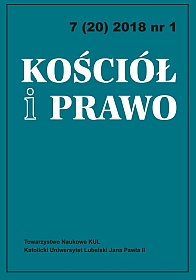How One Must Participate in Holy Mass to Fulfill the Festive Precept?
Abstract
The article presents in-depth analysis of certain questions regarding the appropriate participation in the Holy Mass, based on canonical tradition and current legislation, which contain the documents of the Holy See, the popes, the various dicasteries and commissions of the Apostolic See, as well as the opinions of the experts in canon law and moral theology.
The first chapter describes some attitudes that, according to canonical tradition, can influence the non-fulfilment of the precept of listening to the Mass (cf. can. 1248 CIC/17). It also describes the circumstances that, although they make it difficult to listen to the Mass, do not prevent the satisfaction of the obligation. In this part the role of intellect, awareness and will in relation to the fulfilment of the festive precept was explained and the definitions of physical, moral and spiritual presence were given. Furthermore, the problem of the possibility of fulfilling the obligation by means of social communication has been addressed.
The second chapter analyses the current legislation, beginning with the Second Vatican Council, which replaced the expression “is present”, which had been used up to that time, with the expression “participate”, which intends to underline the full and active participation in the Mass. However, in the 1983 Code of Canon Law the expression “to participate” was accepted in can. 1247, this expression does not require a totally full and active participation, because being present itself, consciously and voluntarily is sufficient to fulfil the festive precept. Nevertheless, the Church strongly recommends that participation which is called more perfect (perfectior participatio), that is, the Mass connected with Holy Communion.
References
Abbo, John A., and Jerome D. Hannan. 1960. The sacred canons. A Concise Presentation of the Current Disciplinary Norms of the Church. Vol. 2. London: Herder.
Augustine, Chas. 1921. A commentary on the new code of canon law. Vol. 6. London: Herder.
Blat, Albert. 1923. Commentarium textus Codicis Iuris Canonici. Romae: Ex. Typ. Instituti Pii IX.
Bouscaren, Timothy Lincoln, and Adam C. Ellis. 1949. Canon law. A text and commentary. Milwaukee: Bruce Publishing Co.
Calvi, Massimo. 2017. “Commento ai cann. 1247-1248.” In Codice di diritto canonico commentato, ed. Redazione di Quaderni di diritto ecclesiale, 1001-1002. Milano: Àncora.
Capello, Felix. 1962. Tractatus canonico-moralis. De sacramentis. Vol. 1. Romae: Marietti.
Coronata, Matteo. 1922. De locis et temporibus sacris. Tractatus theorico-practicus. Augustae Taurinorum: P. Marietti.
D’Annibale, Ioseph. 1908. Summula Theologiae Moralis. Vol. 3. Romae: Desclée.
De Agar, José T.M. 2015. “Commento al can. 1247.” In Codice di diritto canonico e leggi complementari. Commentato, ed. Juan Ignacio Arrieta, 822. Roma: Coletti.
Gasparri, Pietro. 1897a. Tractatus canonicus de Sanctissima Eucharistia. Vol. 1. Parisiis-Lugduni: Delhomme et Briguet.
Gasparri, Pietro. 1897b. Tractatus canonicus de Sanctissima Eucharistia. Vol. 2. Parisiis-Lugduni: Delhomme et Briguet.
Gerosa, Libero. 1995. Das Recht der Kirche. Paderborn: Bonifatius.
Gruppo Italiano Docenti di Diritto Canonico. 2004. Il diritto nel mistero della Chiesa. Vol. 3. Roma: Pontificia Università Lateranense.
Lehmkuhl, Augustin. 1907. Compendium Theologiae Moralis. Friburgi-Brisgoviae: Herder.
Marini, Fabio. 2005. “Il precetto della Messa festiva: un obbligo individuale per un’assemblea che celebra la memoria pasquale.” Quaderni di Diritto Ecclesiale 3 (18): 259-77.
Mierzejewski, Krzysztof. 2014. “Obowiązek uczestnictwa we Mszy św.” Prawo Kanoniczne 58, n. 4:65-88.
Copyright (c) 2018 Kościół i Prawo

This work is licensed under a Creative Commons Attribution-NonCommercial-NoDerivatives 4.0 International License.





